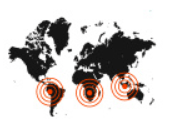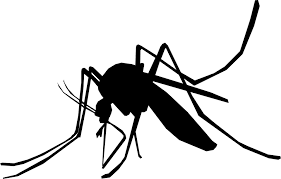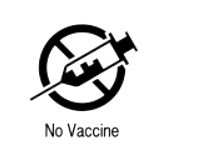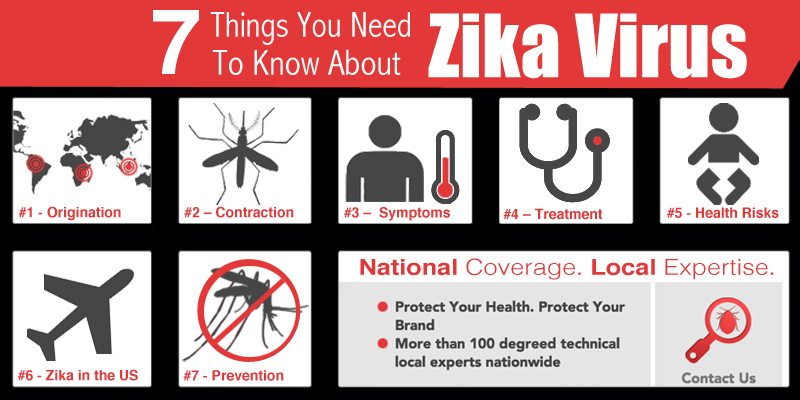Zika virus, a rare mosquito-borne disease may make its way to the continental United States this summer. The Centers for Disease Control and Prevention (CDC) issued an alert for travelers in areas with Zika virus, such as the Caribbean, Central America, and South America. As peak mosquito season approaches, get the facts on Zika virus and see what preventive steps you can take around your facilities.
#1 – Where Did Zika Virus Originate?

Zika virus was first discovered in Uganda in 1947 and outbreaks have occurred in areas of Africa, Southeast Asia, and the Pacific Islands since then. However, this recent outbreak is by far the largest. Puerto Rico, the US Virgin Islands, and American Samoa have all reported local mosquito-borne transmission of Zika virus.
#2 – How is Zika Virus contracted?

The yellow fever mosquito (Aedes aegypti) and the Asian tiger mosquito (A. albopictus) are the primary transmitters of the Zika virus. These mosquitoes are considered to be container breeding species and typically lay eggs in containers that have, or will have, standing water. Empty bottles and cans, tires, buckets and flower pots are commonly used breeding sites. These mosquitoes are aggressive daytime biters, prefer to bite people, and thrive in urban and suburban environments. While found in the U.S. this mosquito’s range is limited to the southern, southeastern, and mid-Atlantic regions.

#3 – Zika Virus Symptoms

In most cases, there are no symptoms (80%); however, when present, symptoms are mild and last less than a week. They include fever, rash, joint pain, and red eyes. These symptoms are typically only present for a few days to a week after infection.

#4 – Zika Virus Treatment

There is no vaccine to prevent, or medicine to treat, Zika virus. Infected individuals should get plenty of rest and drink fluids to prevent dehydration. People usually don’t get sick enough for a hospital visit, and very rarely die from Zika virus. For this reason, many people do not even realize they have been infected.
#5 – Health Risks of Zika Virus

Zika virus is extremely dangerous for pregnant women because it has been linked to birth defects in infants whose mothers are infected during pregnancy. Pregnant women, or those trying to conceive, should refrain from traveling to the countries with the virus until after the baby is born.
#6 – Areas in the US with Zika virus

The US has not reported any local mosquito-borne Zika virus disease cases. However, as of April 20, 2016, there have been 388 travel-associated Zika virus disease cases reported in the US. Visit http://www.cdc.gov/zika/ for the latest information.

#7 – Take Preventive Measures

It is important to take steps around your property to eliminate mosquito breeding grounds. This includes eliminating standing water in or around your property such as empty bottles and cans, tires, buckets, flower pots, cups, and bowls. You will also want to keep windows and doors closed whenever possible and repair any holes or gaps in mesh screens. While spending time outdoors, protect yourself from mosquitoes by wearing long pants, long-sleeved shirts, and closed-toed shoes. Applying an EPA-registered mosquito repellent containing at least 20% DEET, picaridin, or oil of lemon-eucalyptus to your skim will help deter mosquitoes from biting you.
Is Your Property Susceptible to Mosquito Nesting and Breeding?
Peak mosquito season is April through October. Ensure your property is at minimal risk of attracting mosquitos caring Zika virus. Our mosquito control experts will help identify any mosquito-conducive conditions at your facilities. They may suggest mosquito control treatments as an effective step in reducing mosquitoes and larvae around your property. Our Copesan specialists are experts in pest identification and removal, especially when it comes to mosquitoes. Not only can we help treat an existing insect problem, we can also help prevent further outbreaks. Learn more about our pest management solutions.
Mosquito Pest ControlMosquitoes are a major public health threat because they can serve as vectors of numerous human diseases such as West Nile virus, dengue fever, Zika virus, encephalitis, malaria, yellow fever, filariasis and more, especially in tropical areas or wild areas without a good area-wide mosquito management program. |

